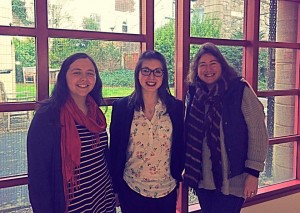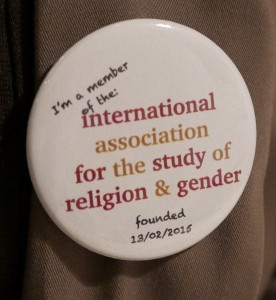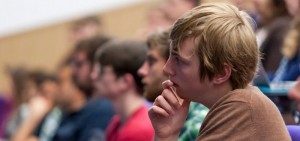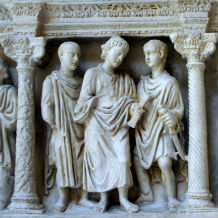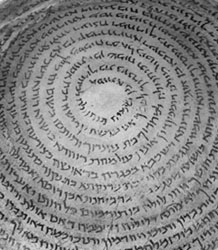Helen John and Rebekah Welton
Between 9th and 11th August 2016, the University of Exeter’s Theology and Religion department hosted a conference entitled ‘Ethnicity, Race, and Religion: Identities, Ideologies, and Intersections in Biblical Texts and Interpretation’. This was made possible due to an AHRC Leadership Grant, for which Professor David G. Horrell is the principal investigator. It brought together participants from such diverse locations as Botswana, Belgium, the USA, and Australia, as well as from across the UK. Such a broad range of backgrounds, worldviews, and scholarly areas of interest precipitated three days of fascinating papers and discussions. In particular, the event was characterized by the desire to learn from one another’s knowledge of issues of ethnicity and race, whether focused on the text, its historical interpretation, or issues and approaches within the contemporary Academy.
The first plenary address was delivered by Professor Musa Dube (University of Botswana) and was entitled: ‘The Bible in the Bush: The First ‘Literate’ Batswana Bible Readers’. Professor Dube introduced the audience to issues of translation and mistranslation in the Batswana Bible, reflecting on the way in which missionary control over translation both entrenched patriarchal systems in the missionised community and violated local beliefs by aligning positive spirits with biblical demons.
In the second plenary, Dr Ma. Marilou S. Ibita from the Catholic University of Leuven, Belgium presented on ‘Of Ioudaioi, Hellēnes and Others: Exploring the (In)Visibility of the Intersections of Ethnic Identities, Religion and Hermeneutics in Biblical Texts from a Lowland Filipina Christian Perspective’. Dr Ibita presented her dialogical approach, focused on ‘maximally Christian identity’ in partnership with ‘maximal solidarity’. This was illustrated by looking at the examples of the Filipina Christian traditions and highlighted the need to be open to biblical interpretations from diverse contexts.
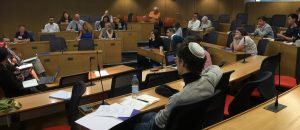 The third plenary address was delivered by Dr Gregory Cuéllar (Austin Presbyterian Theological Seminary, USA) on the topic of ‘S.R. Driver and Higher Criticism: Mapping “the Differences of Race” in Genesis’. Dr Cuéllar took us on a journey through Driver’s reliance on theories of racial hierarchy in his (Driver’s) attempts to interpret Genesis narratives. It was particularly eye-opening to hear some of the ways in which Driver “identified the races” which made it clear that biblical scholarship needs to be aware of its problematic past and realize that “white” should not normative.
The third plenary address was delivered by Dr Gregory Cuéllar (Austin Presbyterian Theological Seminary, USA) on the topic of ‘S.R. Driver and Higher Criticism: Mapping “the Differences of Race” in Genesis’. Dr Cuéllar took us on a journey through Driver’s reliance on theories of racial hierarchy in his (Driver’s) attempts to interpret Genesis narratives. It was particularly eye-opening to hear some of the ways in which Driver “identified the races” which made it clear that biblical scholarship needs to be aware of its problematic past and realize that “white” should not normative.
In amongst these three plenaries were ten papers delivered by a range of scholars, from PhD students to experienced academics. There was an enormous range of topics, ranging from taxation to disability, food to film, identities to representation and biblical texts to biblical hermeneutics. The conference ended with a panel discussion, chaired by Professor Horrell and with input from each of the invitation speakers: Professor Musa Dube; Dr Ma. Marilou S. Ibita; Dr Gregory Cuéllar. One of the stand-out features of this discussion, reflecting on issues raised throughout the conference, was the extent to which participants felt Biblical Studies was characterized by a trend to marginalize non-normative readings, be they from locations further away from its Euro-American centre, or those which do not conform to ‘traditional’ methods of biblical criticism. The conference certainly asked some provocative questions about what precisely biblical criticism is or should be as we move forward into the 21st Century.
Rebekah Welton is a PhD student in the Department of Theology & Religion; Dr Helen John received her PhD in the Department in April 2016

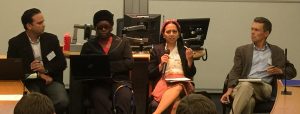
 began my PhD I was excited to start going to conferences and even more excited to give a paper at my first conference. I eased myself in gently with a couple of small postgraduate conferences, giving papers on material I was very familiar with, before moving on to some of the big society conferences. I found myself leaving a fair few conferences feeling quite disappointed. Some were dreadful, some were just ok, all were exhausting. So it was with great trepidation that I set off to an Inter-Disciplinary.net conference entitled “Trauma: Theory and Practice” in Lisbon at the end of March. I was not disappointed and I want to highlight three ways in which this conference rose above the rest.
began my PhD I was excited to start going to conferences and even more excited to give a paper at my first conference. I eased myself in gently with a couple of small postgraduate conferences, giving papers on material I was very familiar with, before moving on to some of the big society conferences. I found myself leaving a fair few conferences feeling quite disappointed. Some were dreadful, some were just ok, all were exhausting. So it was with great trepidation that I set off to an Inter-Disciplinary.net conference entitled “Trauma: Theory and Practice” in Lisbon at the end of March. I was not disappointed and I want to highlight three ways in which this conference rose above the rest.